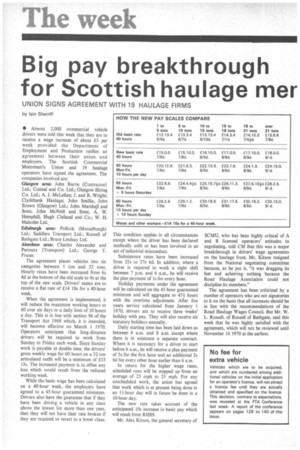Big pay breakthrough for Scottish haulage mer
Page 54

If you've noticed an error in this article please click here to report it so we can fix it.
UNION SIGNS AGREEMENT WITH 19 HAULAGE FIRMS
by lain Sherriff • Almost 2,000 commercial vehicle drivers were told this week that they are to receive a wage increase of about .£3 per week provided the Department of Employment and Production ratifies an ggr eement between their union and employers. The Scottish Commercial Motormen's Union and 19 haulage operators have signed the agreement. The companies involved are: Glasgow area: John Barrie (Contractor) Ltd.; Connal and Co. Ltd.; Glasgow Hiring Co. Ltd.; A. J. McLellan; J. and R. Wright; Clydebank Haulage; John Smillie, John Brown (Glasgow) Ltd.; John Marshall and Sons; John McNeill and Sons; A. W. Hemphill; Hugh Clelland and Co.; W. H. Malcolm Ltd._ Edinburgh area: Pollock (Musselburgh) Ltd.; Saddlers Transport Ltd.; Russell of Bathgate Ltd.; Bruce Lindsay Ltd.
Aberdeen area: Charles Alexander and Partners (Transport) Ltd.; George T. Fraser.
The agreement places vehicles into six categories between 1 ton and 32 tons. Hourly rates have been increased from 6s 4d at the bottom of the old scale to 9s at the top of the new scale. Drivers' mates are to receive a flat rate of £14 lOs for. a 40-hour week.
When the agreement is implemented, it will reduce the maximum working hours to 60 over six days or a daily limit of 10 hours a day. This is in line with section 96 of the Transport Act 1968 which, it is intended, will become effective on March 1 1970. Operators anticipate that long-distance drivers will be required to work from Sunday to Friday each week. Since Sunday work is payable at double time, the drivers' gross weekly wage for 60 hours on a 32-ton articulated outfit will be a minimum of £33 15s. The increased payment is to offset any loss which would result from the reduced working week.
While the basic wage has been calculated on a 40-hour week, the employers have agreed to a 45-hour guaranteed minimum. Drivers also have the guarantee that if they have been driving a vehicle in any class above the lowest for more than one year, then they will not have their rate broken if they are required to revert to a lower class. This condition applies in all circumstances except where the driver has been declared medically unfit or has been involved in an act of industrial misconduct.
Subsistence rates have been increased from 25s to 27s 6d. In addition, where a driver is required to work a night shift between 7 p.m. and 6 a.m., he will receive the plus payment of Is for every hour.
Holiday payments under the agreement will be calculated on the 45-hour guaranteed minimum and will aggregate to 471 hours with the overtime adjustment. After five years service calculated from January 1 1970, drivers are to receive three weeks' holiday with pay. They will also receive six statutory holidays annually.
Daily starting time has been laid down as between 6 a.m. and 8 a.m. except where there is in existence a separate contract. Where it is necessary for a driver to start before 6 a.m., he will receive a plus payment of 5s for the first hour and an additional 2s 6d for every other hour earlier than 6 a.m.
In return for the higher wage rates, scheduled runs will be stepped up from an average of 23 mph to 25 mph. For any unscheduled work, the union has agreed that work which is at present being done in an 11-hour day will in future be done in a 10-hour day.
The new rate takes account of the anticipated lOs increase in basic pay which will result from RH89.
Mr. Alex Kitson, the general secretary of SCMU, who has been highly critical of A and B licensed operators' attitudes to negotiating. told CM that this was a major breakthrough in drivers' wage agreements on the haulage front. Mr. Kitson resigned from the National negotiating committee because, as he put it, "it was dragging its feet and achieving nothing because the Road Haulage Association could not discipline its members."
The agreement has been criticized by a number of operators who are not signatories to it on the basis that all increases should be in line with the recommendations of the Road Haulage Wages Council. But Mr. W. L. Russell, of Russell of Bathgate, said this week that he was highly satisfied with the agreement, which will not be reviewed until November 16 1970 at the earliest.




































































































































































































































